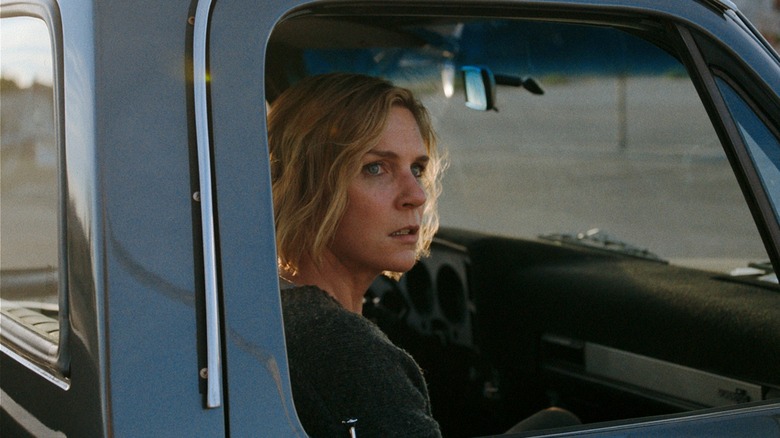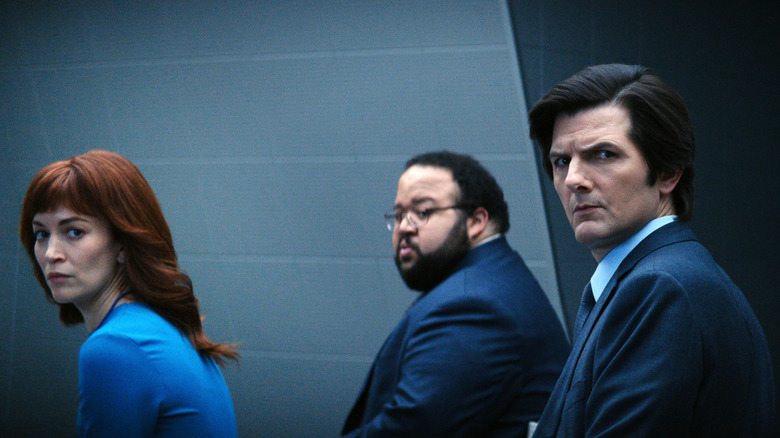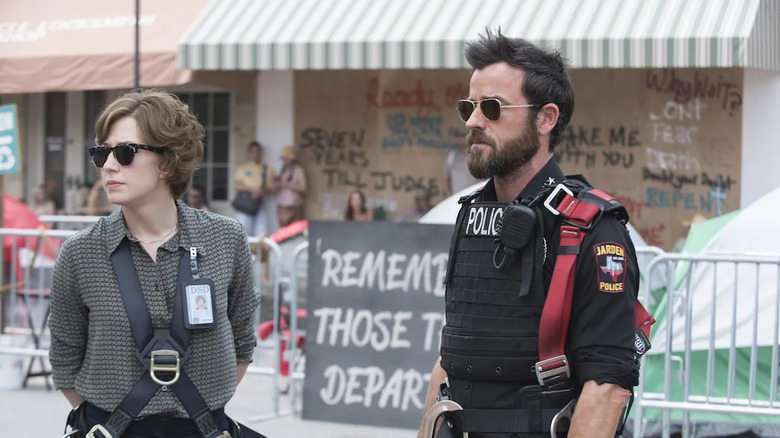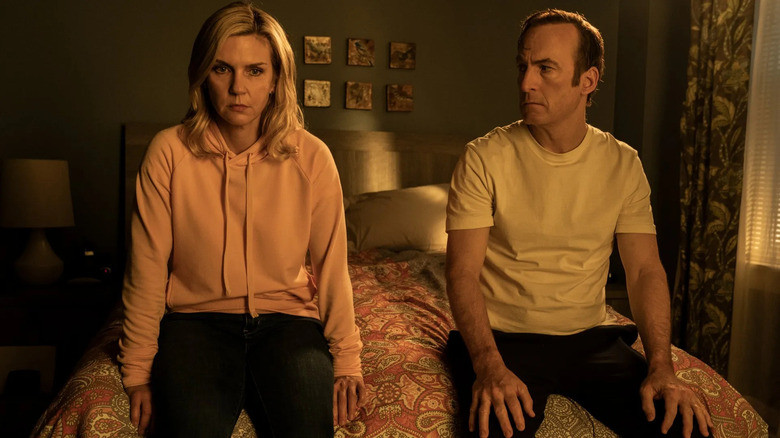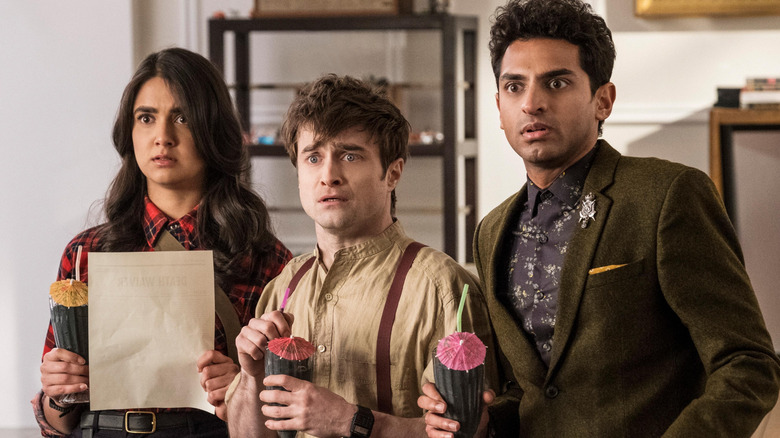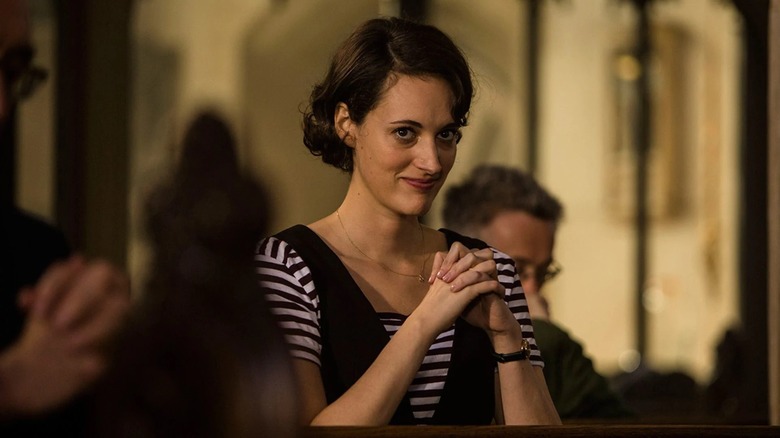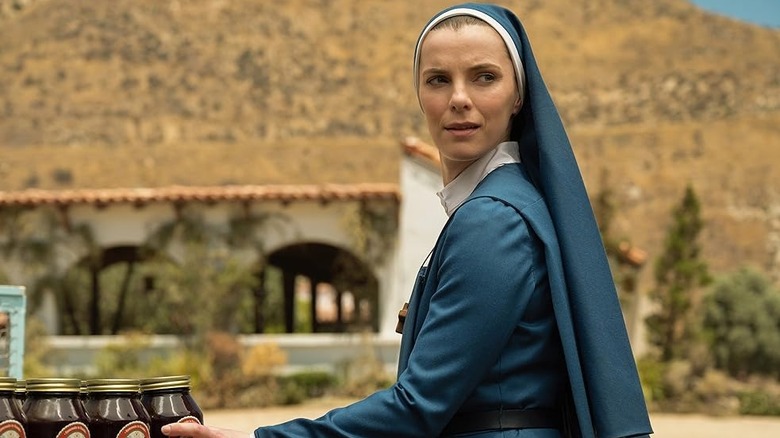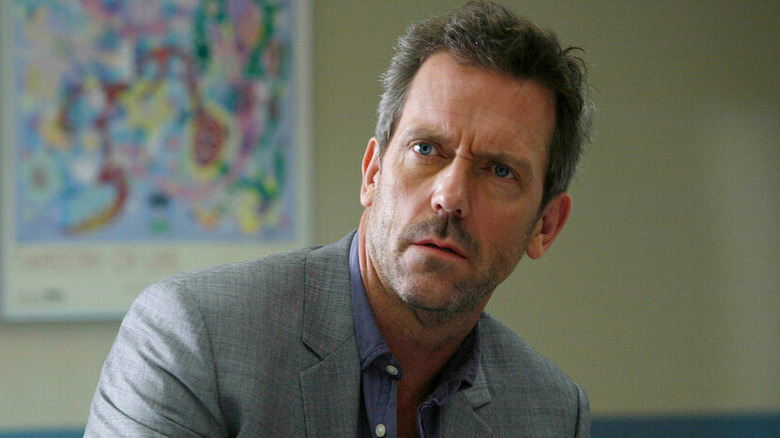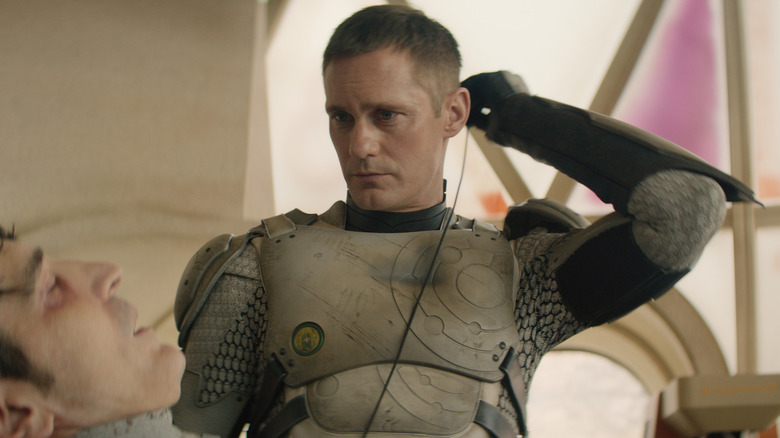10 Best TV Shows Like Apple TV's Pluribus
Unsurprisingly, the new television series from "Breaking Bad" creator Vince Gilligan is captivating the country. "Pluribus" feels more like a stylistic successor to Gilligan's "Breaking Bad" prequel series "Better Call Saul" thanks to its wry humor and lead-driven structure, but its plot utilizes mysterious science fiction rather than gritty realism. Rhea Seehorn stands out as the show's lead, Carol, who is one of just a handful of people worldwide who has not been affected by a mysterious virus that has turned almost everyone into contented citizens.
If you've fallen in love with "Pluribus" like so many other people out there, then you may be looking for similar things to watch, shows that ask compelling questions about society and the meaning of life, or ones that surprise you with humor in the same disarming way. While Gilligan is certainly a visionary, there are definitely a few shows that have paved the way for "Pluribus" by exploring similar questions, motifs, and styles. Check out the following series if you want to scratch that "Pluribus" itch.
Severance
The series that made Apple TV the place to go for genre-bending, prestige dramedies, "Severance" has been a hit with both audiences and critics. "Pluribus" is a more recent installment in the streaming service's long-term approach to magical realism and science fiction, but it follows a very similar set up. While "Severance" is more overtly disturbing (it's about an entire consciousness that only exists in a workplace, an incredibly grim thought), it's similar to "Pluribus" in that it takes a world very similar to contemporary reality and introduces a whole new framework, turning what we know upside down.
"Pluribus" is more ambitious than "Severance," with its undefined, antagonistic force (the existence of which isn't even technically confirmed) seeking to completely alter humanity as a species. It's also, surprisingly, a bit sadder. While "Severance" begins with a much more grim premise, the show is really about the resilience of human spirit and how people can create community even in the most bleak conditions. "Pluribus" hasn't committed to an optimistic point-of-view, and in fact seems to be an interrogation of happiness itself.
The Leftovers
A show that was underappreciated when it began airing over a decade ago, "The Leftovers" is a lot better than people think. Why didn't it take off back in the mid-2010s? Well, it tackles subject matter that wasn't as out in the open as it is today, telling a story about loneliness and depression that will no doubt hit home for modern TV viewers, especially those who enjoyed "Pluribus." In short, "The Leftovers" offers a tangible, dramatic, cosmic explanation for why people feel wrong sometimes, and with that the show explores emotional pain in minute detail.
"The Leftovers" follows people left over after a rapture disappears a small percentage of the world's population. Many people struggle to grasp the gravity of the situation, while others pull away from the herd, becoming even more isolated in this new world. Of course, Carol doesn't have the luxury of a world grappling with the same gigantic change as her, as there are only a dozen people on the whole planet who haven't been impacted by this happy virus. "The Leftovers," like "Pluribus," is about exploring the balance between the individual and society — it asks when the two should be held distinct and the strengths of prioritizing one over the other.
Better Call Saul
Vince Gilligan made a name for himself with "Breaking Bad," but he earned a lot of his audience thanks to the more low-profile, slow-burning series "Better Call Saul." There are a lot of great characters in "Better Call Saul," but Kim Wexler is arguably the most complex, and she's played by none other than Rhea Seehorn, the star of "Pluribus." While the two shows don't share many elements in terms of plot, genre, or theme, they are both products of one of the best TV creators of all time and they both feature the under-appreciated acting of Rhea Seehorn, so "Pluribus" fans will no doubt enjoy "Better Call Saul."
"Better Call Saul" has many great supporting characters, though it's first and foremost a show about shady lawyer Saul Goodman, real name Jimmy McGill (Bob Odenkirk). Gilligan explores the complexity of morality through Jimmy's journey. There are a lot of real-life people who don't live by the law or any other set standard of ethics, but rather by a personal code of conduct. What does it mean to facilitate another person's lack of moral responsibility? Gilligan poses just as many human questions in "Better Call Saul" as he does in "Pluribus," he just uses a different canvas.
Miracle Workers
"Miracle Workers" is a hidden gem that has gone largely uncelebrated despite starring the delightfully talented trio of Daniel Radcliffe, Steve Buscemi, and Geraldine Viswanathan. There are not nearly as many laughs in "Pluribus" as there are in "Miracle Workers," and that's because "Miracle Workers" is a straight-up comedic satire, but fans of the Apple TV show will no doubt love it. It's different from "Pluribus" in terms of genre, but its first season (it's an anthology series, so each season has a different premise) is about God and his many angelic workers who make the world go round.
In Season 1, Buscemi plays God, in this case envisioned as the strange, underachieving black sheep of a cosmic family of higher beings. Turns out, free will was an ill-advised notion and they think he should put a stop to the whole "Earth" experiment. Radcliffe and Viswanathan play a couple of angels in the miracles department who seek to change his mind by successfully coaxing a couple of humans into embracing the miracle of a romantic spark. It's a romantic comedy on paper, but it's also a high-concept examination of humanity and the function of free will, much like "Pluribus."
Fleabag
Rhea Seehorn's stellar work in "Better Call Saul" went somewhat under the radar, so it's great to see her getting the plaudits she deserves for "Pluribus." As Carol, she has to accomplish two things. She needs to function as a stand-in for the viewer, the in-universe voice asking the same questions anyone might ask should they find themselves in her position. The other thing that Carol needs to do is be entirely unique. In a world where most people share the same mind, it is especially crucial that Carol be compelling, and no character can be compelling without presenting a point-of-view that feels original. She succeeds in doing this, just like Phoebe Waller-Bridge does in "Fleabag."
"Fleabag" isn't a show that uses magical realism, but it does rely on several surreal elements because it is so steeped in the warped perspective of Waller-Bridge's titular character. How the audience views Fleabag in the beginning of the show is probably very much like what Carol might seem to be from the perspective of the human hive-mind in "Pluribus." To anyone observing, both Fleabag and Carol look like they're working against their own self-interests. The way that both characters encapsulate multitudes — they can be unlikeable and incredibly relatable at the same time — is one of the biggest draws of both shows. If Seehorn's performance is what you love most about "Pluribus," then you should definitely give "Fleabag" a try.
Sense8
No matter what kind of existential threat a fictional story presents, there is always an alternative version of it that feels like it was approached with a totally different understanding of life and humanity. "Pluribus" uses a seemingly extraterrestrial virus as a means of exploring the abandonment of individuality, but "Sense8," a Netflix series from Lana and Lilly Wachowski, takes a different approach. The show doesn't offer an apocalyptic scenario wherein everyone except a spare few are absorbed into one mass consciousness, but it does explore the possibilities of extending empathy beyond the abilities of a regular human mind.
"Sense8" follows eight main characters from different parts of the world — an actor in Mexico, a criminal in Germany, an executive in South Korea, etc. — and establishes an instant psychic link between them. Each of them receives this intense, challenging gift in different ways, but none dispute that it is a gift, as they all come to understand themselves and the world far more clearly thanks to the influence of their cluster. They can even utilize each others' skills and abilities from halfway across the world. "Sense8" leaves room to celebrate each character's individuality, though. They are all seen as unique parts of a bigger whole rather than cogs in an unseeable machine.
Mrs. Davis
The rise of artificial intelligence has been a cause of concern for many, and veteran TV producer Damon Lindelof plays into those fears with his show "Mrs. Davis," which he co-created with "The Big Bang Theory" writer Tara Hernandez. The titular character is an AI that has supposedly helped humanity by preventing war and famine. The show follows a young nun named Simone (Betty Gilpin) who blames the ubiquitous AI for the disappearance of her father. She works to dismantle Mrs. Davis before it can take over the world entirely.
Simone is presented with a chance to end Mrs. Davis and her influence when her rebellious former boyfriend, Preston (Jake McDorman), comes back into her life. Just like Carol in "Pluribus," Simone feels like one woman standing against an indoctrinated horde of people who are seemingly only focused on giving her exactly what they think she wants, whether she agrees to it or not. The two shows are tonally different, but fans of one will undoubtedly get a kick out of the other. Interestingly, Lindelof's 2nd grade teacher inspired parts of "Mrs. Davis," including the titular AI's name.
Paradise
Perhaps as a result of world events in recent years, we've seen many shows of late that envision one massive, unfathomable change that wipes the slate clean logistically but not emotionally. Shows that do this are looking for a safe way to explore the volatility of modern times without directly poking at current events. "Pluribus" appears to be following this trend: The first episode makes it clear that the show is about the importance of retaining our humanity in a new age of social media and artificial intelligence. It does this subtly by imagining a world beset by a virus that robs us of individuality. "Paradise" is another show that offers a worrying vision of the future.
"Paradise," like "Pluribus," isn't interested in endless exposition. Both shows offer a premiere episode that ends on an enormous reveal, but a reveal that feels like the tip of a very large iceberg. "Paradise" is about a post-apocalyptic society that was built under a mountain in preparation for an extinction-level event. But more than that, it's about the perpetuity of power and politics. The first season of "Pluribus" is still taking shape as of this writing, but it provides the same kind of fish-out-of-water reset that "Paradise" does and with the same level of thrills.
House, M.D.
"Pluribus" is not the first television show to present a lead character that seems, at first, resistant to happiness. It's more complicated than that — Carol is a woman grieving, surrounded by a strange, hive-mind force of humanity that she doesn't trust — but it's interesting to consider what it means to fight happiness. "House, M.D." offers up a character who works very efficiently in depriving himself of good things. He is irritable and caustic, toxic to co-workers, and only able to get away with his abominable bed-side manner because he's one of the greatest diagnosticians in the world.
Hugh Laurie's Dr. Gregory House is one of the best TV characters of the 21st century, and part of the appeal is how rugged and resistant to happiness he is. As his only real friend, Dr. James Wilson (Robert Sean Leonard) often highlights his aversion to positive progress, but he doesn't always address that this aversion likely comes from House's despair over his unprocessed inner turmoil. Both "House, M.D." and "Pluribus" ask audiences to consider whether or not happiness can truly be achieved by ignoring pain.
Murderbot
At first glance, "Murderbot" doesn't have much in common with "Pluribus" except that both are new Apple TV shows. "Murderbot" is one of the best TV shows of 2025, though, and it's likely that "Pluribus" will snag a spot on that list, as well. However, their comparative quality isn't the main reason they might appeal to the same viewers. "Murderbot" is a great follow-up to "Pluribus" thanks largely to its lead character: Murderbot, a Security Unit (shortened to SecUnit in the world of the show) played to perfection by Alexander Skarsgard.
Skarsgard's character is an advanced robot who has managed to break the code keeping him under corporate control. The same sense of unease that comes from watching Carol deal with her overly cheery caretakers on "Pluribus" also pervades "Murderbot," as the titular SecUnit must operate in a state of constant paranoia and caution to make sure no humans discover that he has defeated his programming. The similarities between Carol and Murderbot don't stop there, either. Both are extremely dedicated to preserving their free will, but neither of them seem to have a particular reason for that vigor — in fact, they're both quite depressed.
